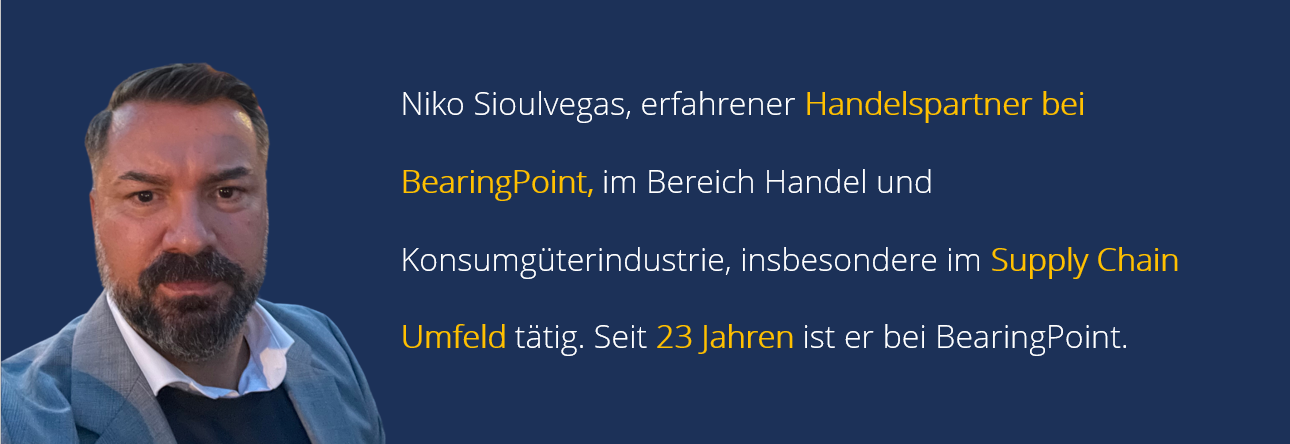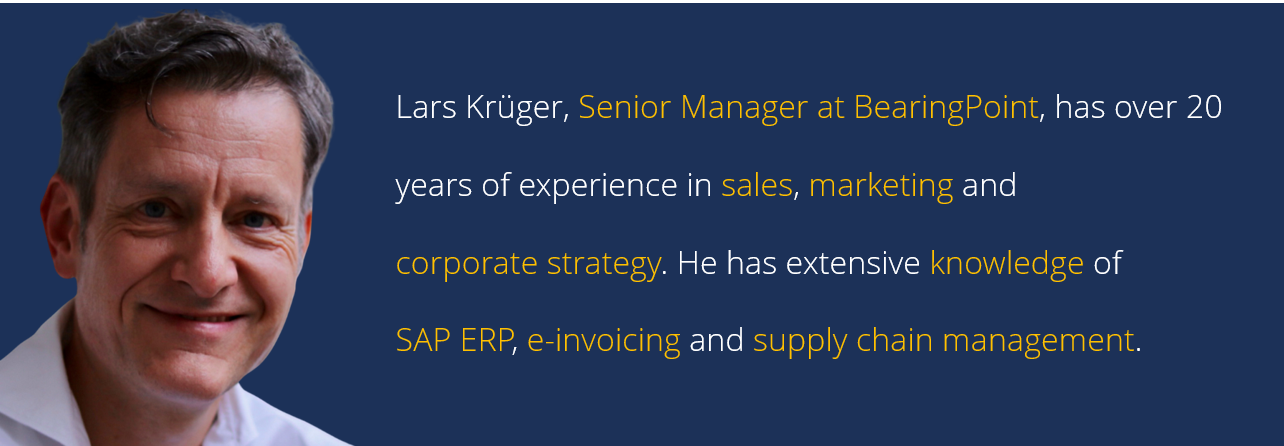Existing customer? Login
Interview
February 9th, 2024
ERP Transformation and Value Management Pt. 2 - Exclusive Interview with Lars Krüger und Niko Sioulvegas from BearingPoint
 Rubina Hatziparassidis
Rubina Hatziparassidis
Welcome to the second part of our captivating interview with Niko Sioulvegas, Partner BearingPoint, as well as Lars Krüger, Senior Manager Business Development at BearingPoint Germany. In the first part, we gained insights into BearingPoint's current focal points, specifically in the area of ERP transformations and Value Management. We gained valuable insights into best practices, challenges and BearingPoint's holistic approach to transformation projects.
Without further ado, let's dive in and learn more about the innovations and best practices in the ERP landscape from BearingPoint. Enjoy your reading!
How do you ensure that ERP transformations not only meet current requirements but also address future needs of companies? How do you handle uncertainties regarding future technology trends?

Trends are a tricky aspect. For instance, looking at trends in the retail sector, ranging from connectivity like cash-free retail, omnichanneling, blockchain shopping to globalization such as nearshore, curated shopping, local commerce, and mobility and neo-economy like zero-waste packaging, the complexity is boundless. As a management consulting and consulting firm, ideally, we aim to be two steps ahead in knowledge. However, predicting whether a trend will truly prevail and be sustainable is something we cannot know. We refrain from making predictions. Nevertheless, we collaborate closely with relevant institutions to assess these topics correctly and provide recommendations and solutions. Focus is crucial for us too. To ensure that transformations meet future requirements, flexibility is paramount. Incorporating agile methods and regular system checks help adapt to new requirements. To deal with uncertainties regarding future trends, it is important to choose an architecture that allows extensions and integrations to seamlessly incorporate new technologies.

Contact Information
Niko Sioulvegas | Partner BDM
BearingPoint | Speicherstrasse 1 | 60327 Frankfurt am Main
+49 69 13 02 24 507 | nikolaos.sioulvegas@bearingpoint.com
LinkedIn Profil | BearingPoint
There are generally two philosophies when selecting software tools: Best-of-breed (selecting the best-suited software/isolated solution for each purpose) or All-in-one (a software solution containing all necessary applications, procurement suites). Which philosophy do you and BearingPoint follow?

Fundamentally, the goal is to understand a company's individual needs, leading to specific questions. Why is new software needed? What are the specific requirements? What goal or strategy is the company pursuing? etc. In conjunction, we need to assess the existing system landscape. Based on this information, we work with the client to develop a target image.
Best-of-breed solutions can be highly efficient for certain critical processes or specialized requirements. They often offer greater functionality and specialization for a specific purpose. This approach allows selecting the best available tools for specific requirements to maximize efficiency and performance.
However, an All-in-One solution often brings seamless integration and a centralized platform, easing administration and data flow. These solutions can cover a broad range of functions and offer a unified user interface, improving user-friendliness.
Want to learn more about how SCALUE's solution can help you optimize your procurement?
I don't mean to imply that one philosophy is right and the other wrong. It is essential to evaluate how a customized solution for a company's task might look. This could be a balanced mix of Best-of-Breed functionality and integration within an All-in-One platform. The flexibility resulting from combining both approaches allows leveraging the strengths of various tools while creating an efficient and well-integrated system landscape.

Contact Information
Lars Krüger | Senior Manager BDM
BearingPoint | Altrottstraße 31 | 69190 Walldorf
+49 17 56 17 42 15 | lars.krueger@bearingpoint.com
LinkedIn Profil | BearingPoint
In conclusion for our readers, possibly involved in similar transformation processes, what best practices or advice would you recommend to ensure a successful ERP transformation and effective Value Management?

Certainly, each company must be individually considered. However, it has been proven from practice that the following points, even though commonly heard, need to be reiterated like a mantra to create the Conditions for a successful transformation:
1. It starts with choosing the right partner
Selecting a qualified partner is crucial, one with not only technical expertise but also experience in similar transformation projects and the industry, along with an understanding of Value Management.
2. Management engagement is critical
The commitment of the leadership is crucial. Leaders must not only clearly communicate the vision of the transformation but also actively participate and motivate employees.
3. Comprehensive understanding of business processes
A profound understanding of existing business processes is crucial. Before starting the transformation, all stakeholders must understand the processes to allow effective adjustment and optimization.
4. Value Management with clear objectives and metrics
Define clear goals for the transformation and establish metrics to monitor progress. This allows quantifying the created value and ensuring that goals are achieved.
5. Serious, open, and transparent communication is essential
Ensure that all stakeholders are regularly informed about progress. This builds trust.
6. Apply agile methods
Agile methods, such as Scrum, can enhance the flexibility and adaptability of processes during the transformation process. This allows quickly responding to changes and achieving incremental progress.
7. Precise resource allocation is also crucial
Ensure that necessary resources are available to successfully implement value-based sub-projects.
8. Change Management
Changes can evoke resistance. An effective Change Management program is essential to ensure that employees accept and actively participate in the transformation.

How SCALUE can help you? Schedule a free demo now!
Learn more on our blog: Get More Insights
Follow us on LinkedIn: Get more Content